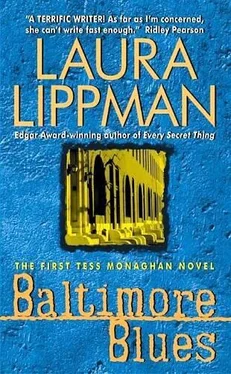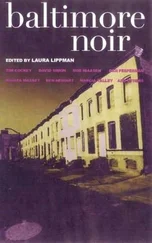Laura Lippman - Baltimore Blues
Здесь есть возможность читать онлайн «Laura Lippman - Baltimore Blues» весь текст электронной книги совершенно бесплатно (целиком полную версию без сокращений). В некоторых случаях можно слушать аудио, скачать через торрент в формате fb2 и присутствует краткое содержание. Жанр: Триллер, на английском языке. Описание произведения, (предисловие) а так же отзывы посетителей доступны на портале библиотеки ЛибКат.
- Название:Baltimore Blues
- Автор:
- Жанр:
- Год:неизвестен
- ISBN:нет данных
- Рейтинг книги:4 / 5. Голосов: 1
-
Избранное:Добавить в избранное
- Отзывы:
-
Ваша оценка:
- 80
- 1
- 2
- 3
- 4
- 5
Baltimore Blues: краткое содержание, описание и аннотация
Предлагаем к чтению аннотацию, описание, краткое содержание или предисловие (зависит от того, что написал сам автор книги «Baltimore Blues»). Если вы не нашли необходимую информацию о книге — напишите в комментариях, мы постараемся отыскать её.
Baltimore Blues — читать онлайн бесплатно полную книгу (весь текст) целиком
Ниже представлен текст книги, разбитый по страницам. Система сохранения места последней прочитанной страницы, позволяет с удобством читать онлайн бесплатно книгу «Baltimore Blues», без необходимости каждый раз заново искать на чём Вы остановились. Поставьте закладку, и сможете в любой момент перейти на страницу, на которой закончили чтение.
Интервал:
Закладка:
Back home, Tess changed into a T-shirt and shorts and turned on her stereo. Although she had a CD player, she owned almost no compact discs-she had signed on to the technology revolution about a month before the Star folded. By financial necessity she listened primarily to the albums and tapes of her college days. Alternative stations kept her current with new music, but she found herself more interested in old music: Cole Porter, Johnny Mercer, Rodgers and Hart. All the standards, except Irving Berlin. She had been forced to play the Statue of Liberty in eighth grade and never quite gotten over "Give me your tired…" And one of the immigrants had pinched her ass.
The Abramowitz file was a mix of old and new technologies. Photocopies of old clips, printouts from microfiche, the computerized printouts of a Nexis search, which scanned a national data base of newspapers. The Beacon-Light librarian had even found a fawning profile of him in the city magazine, a deservedly defunct rag called B-more .
Her desk was too small to hold these riches. She spread the contents of the folder across the floor, separating the clips and photos into three piles representing the distinct phases of his career. Public defender. Plaintiff's attorney. Corporate.
The first phase of his career seemed the most promising, given that many of the people he defended had already either killed or raped someone. Tess knew a disgruntled defendant was much more likely to track down his own lawyer than a prosecutor or a judge. After all, the prosecution is supposed to put you away, and the judge is just following a rule book, but your lawyer is paid to put up a good fight. Even if it's not your nickel, as in the case of Abramowitz's early clients, one expects to get his money's worth. As a reporter Tess once saw a nineteen-year-old react to a guilty verdict for manslaughter by grabbing his P.D. by the back of the neck and methodically pounding her head against the table until the bailiff intervened.
But Abramowitz's clients, at least the ones who made the papers, seemed to adore him. The stories about him as a public defender stressed his heroics. He had won three out of the seven death penalty cases he tried, which made his early reputation, but that accomplishment had faded with time. In fact, the state's attorney's office seldom went for the death penalty in Baltimore any more.
Cop Killer Goes Free on Technicality . Tess remembered that case. The "technicality" had been an illegal search and seizure, that pesky fourth amendment thing. Abramowitz had been vilified for his unapologetic defense of Donald Bates, who in all probability was a cop killer, but the state failed to prove it when the judge excluded key evidence from the trial. Bates ended up dying two years later, shot to death by a cop answering a call for a domestic dispute. Interestingly there had been no record of the 911 call summoning the cop to the scene, but no one had pressed the issue. Bates would have lived longer, much longer, on Death Row.
Tess jotted down the name of the cop who had killed Bates, and the names of the relatives of the cop who had been killed. It had been twelve years ago, but time passed differently for some people. Again, Tess wrote down the names of the victims' relatives.
Abramowitz's losses were more interesting, but men on Death Row seldom had the funds or mobility to pursue vendettas. And, again, none of Abramowitz's convicted clients seemed to bear him ill will. A photo of one showed him bear hugging the lawyer, while Abramowitz stared down at the floor, seemingly embarrassed by the show of affection and gratitude. Or perhaps he was pissed at losing, Tess thought.
Tucker Fauquier embraces his lawyer, Michael Abramowitz, moments after an Anne Arundel County jury returned a death sentence for the murder of Joey Little. It is expected Fauquier will now enter guilty pleas in the other murders of which he is suspected.
Tucker Fauquier. Tess remembered him. Anyone who had been alive in Maryland that year remembered him. Born in the western Maryland town of Friendsville, he had decided one day to work his way across the state by killing and sexually molesting a boy in each county. He was twenty-two when he began, venturing out to distant counties-Worcester, Cecil, Dorchester-where he would kidnap a boy, kill him, then bury him. At first he was careful, spacing out his visits, and law officials made no connection, not publicly. Baltimore, Prince George 's, Calvert. But after six cautious years, Fauquier became bolder. He kidnapped a boy from his home county of Garrett, then went to Allegany where he procured another boy to witness the first boy's murder. Then from Allegany to Washington County, where a Hagerstown boy watched him kill the Allegany boy. And so on. He was halfway to his goal-twelve victims out of Maryland 's twenty-four jurisdictions-when an Anne Arundel County boy, the latest witness and soon-to-be victim, leaped from the car as Fauquier slowed to pay the toll on the Bay Bridge.
Tess studied his picture. She had been in college at the height of Fauquier's spree and knew his name far better than his face. A slight man, with bad skin and straggly blond hair. He could have been anyone at the edge of one's life-a gas station attendant, convenience store clerk, pants presser at the dry cleaner's. Just one of those vague, blurry faces on which one never quite focuses. He had been lucky to have Abramowitz for his lawyer. His execution may not be the state's first in the modern era, but it would be the most eagerly anticipated.
Abramowitz's other losses in death penalty cases were less interesting. A robber, a rapist, another robber. Rich man, poor man, beggar man, thief , Tess thought to herself as she wrote down another group of names. The cases against them were notable only for the futility of presenting a defense at all.
As she moved forward through each year of clippings, Abramowitz seemed to disappear. Fauquier was his last big case. The murder trials on page one gave way to briefs, five-paragraph stories about sexual assault trials and what were known as misdemeanor murders-one lowlife killing another lowlife. Once Abramowitz left the public defender's office, his practice had been the kind of DWI/slip and fall/birth defects office that seldom draws any publicity, except for occasional editorials and columns decrying ambulance chasing and lawyer advertising. This second phase of his life had produced only one full-length clipping, a feature story about a rap song inspired by his instant camp commercials. "I'm highly flattered," Abramowitz had told the reporter.
At least half the file contained photographs of him at society events, most taken in the past year, perhaps part of a desperate attempt to make himself respectable. Abramowitz at the symphony, Abramowitz at a concert to benefit a local AIDS foundation, Abramowitz at the March of Dimes ball, Abramowitz at the United Way kickoff. He never seemed to have a date or a smile, and he was never photographed with anyone who really mattered, except for two pictures with his employer, the senior "O" at Triple O, Seamon P. O'Neal. In both of those, taken at fund-raisers for the foundation named for O'Neal's famous father-in-law, developer William Tree, Abramowitz's arm was slung around O'Neal's neck while O'Neal stared deeply into his cocktail glass, only the part in his hair visible. Abramowitz smiled broadly in these photos, obviously proud to be seen with someone considered the model of integrity and class. He had made it.
Other than these photos, the last phase of Abramowitz's life had garnered little attention. There was a short, one-graph item about his decision to close his own practice and join the Triple O, published in the fall of 1992. And, in June of this year, there was a column item, a "brite," albeit one written by someone without much feel for the form.
Читать дальшеИнтервал:
Закладка:
Похожие книги на «Baltimore Blues»
Представляем Вашему вниманию похожие книги на «Baltimore Blues» списком для выбора. Мы отобрали схожую по названию и смыслу литературу в надежде предоставить читателям больше вариантов отыскать новые, интересные, ещё непрочитанные произведения.
Обсуждение, отзывы о книге «Baltimore Blues» и просто собственные мнения читателей. Оставьте ваши комментарии, напишите, что Вы думаете о произведении, его смысле или главных героях. Укажите что конкретно понравилось, а что нет, и почему Вы так считаете.












